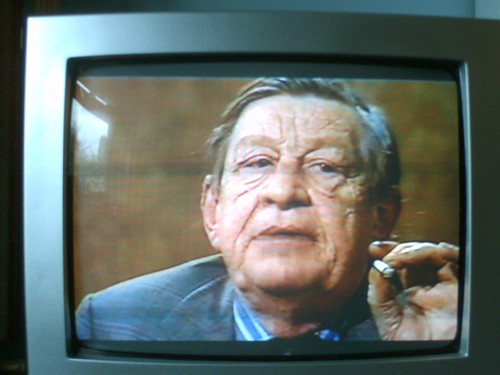, V.S. Naipaul
"There are nights when I think that Sal Paradise was right. Boys and girls in America have such a sad time together." - Craig Finn, the Hold Steady, "Stuck Between Stations"I'm sorry to admit that I decided to re-read Kerouac's
On the Road based on a rock lyric. The first time I read
On the Road was sometime in high school, and all I can remember about that read was that I didn't like it. I'm not categorically against Kerouac - I rather like
Dharma Bums - but I do recall being put off by both the writing itself, as well as the beat ethic itself, most puzzlingly portrayed by Sal Paradise's adoration of Dean Moriarty. Puzzling because Dean Moriarty is a complete asshole.
On second read, my opinion of
On the Road hasn't changed much. I still don't care for the writing itself - it's much too ragged and unfocused for my tastes. Of the four journeys that form the chapters of the book, only Sal and Dean's trip into Mexico has enough momentum and spectacle to really sustain interest. Aside from Sal and Dean, few of the many people we meet on the road are made real - some stand out as interesting caricatures (Old Bull Lee), but the more engaging are left on the sidelines (Remy, Galatea, Sal's aunt, the various jazzmen that Sal describes). The only departures for me, from my initial reading, was noticing how much of the novel took place in Denver and the midwest, as opposed to San Francisco and New York, and how often Sal Paradise felt it necessary to comment on how sad everything was.
On the Road is more interesting in its historical context, partly as the herald for the beat ethic itself, with Kerouac banging out the novel in one long, three-week go on a single roll of typewriter paper, and partly for the sketches it offers of prominent figures from 1950's counter-culture. Central among these characters is, of course, Dean, Kerouac's Neal Cassady character. Dean's start in life is tough, clearly, and he is a transcendent son-of-a-bitch - hustling, on the make, lanky and larger than life. Criss-crossing the country, raising hell, and charming women, Dean provides only the slightest picture into the phenomenon of
Neal Cassady, I'm sure. A key figure in both the Beat movement, and later, as part of Ken Kesey's
Merry Pranksters, the psychedelic era, Cassady is fascinating.
But it doesn't take away from the fact that Dean is an asshole, and aside from re-paying Sal's aunt fifteen dollars ten years later, and maybe returning to Inez, it's hard to say that Dean did a right turn the whole novel through. PB rightly pointed out that, even if On the Road is about Dean, it had to be narrated by Sal, and Dean had to be adored by Sal, because otherwise Dean is an utterly unsympathetic character. The counterpoint is necessary. This insight was reinforced when RM and I were watching
Ferris Bueller's Day Off on TV on a Friday afternoon. Ferris, though charming, is also an asshole.
Denis Johnson is probably my favorite American writer. If you haven't read him, start with any of
California Gothic,
Jesus' Son, or
The Name of the World. Having read most of Johnson's work, I tracked back to
Angels, his debut novel. Admittedly, I am a sucker for first efforts, particularly novels and films.
Angels, while a fine, light read is skippable. Like most of Johnson's work, you can almost hear the sound track while reading - and the novel's opening sequences (up through Jamie's troubles in Chicago) can be soundtracked to
Sympathy for the Devil. The rest reads like
Reservoir Dogs, cool writing about uncomfortable situations, but in the end, leaving a couple of memorable scenes, and none of the deeper resonance of his later work.
I can recommend
Time's Arrow by Martin Amis in so far as it is a brisk read, and an inventively written novel. A story told backwards by a narrator physically experiencing another man's life, the conceits of storytelling are engaging. The larger moral problems with which the novel proposes to grapple, were not. But then again, I'm not a doctor. Or a Nazi.
The paperback edition of Naipaul's
A Bend in the River has one of the more memorable covers that I've recently come across. The novel itself was good, although I had a problem with it that I am increasingly having with a lot of novels - the beginning was great, the middle good, and the end left a lot to be desired. And I have this problem, disproportionately, with novels about the experience of Indians in the diaspora.
A Bend in the River relates the story of Salim, a young Indian raised in East Africa, and his move to a river outpost in central Africa (presumably the Congo), where he runs a market and establishes his personal independence from his family and their expectations. Echoing
Heart of Darkness, as well as more contemporary novels like
Things Fall Apart, Salim watches and is eventually swept up in the tide of change that re-shapes post-colonial Africa. The story's opening, relating Salim's personal and cultural dislocation, as a stranger in a strange land - a changing East Africa, and then an utterly foreign central Africa - is clear and compelling. The tension and turmoil are muted, but palpable. As the revolution comes, Salim reflects the changes in the country through his own life. Political changes slowly encroach upon his personal life, eventually distorting and consuming it. He recounts experiences, the loss of ownership of his store, his changed relationship with his servant, a love affair with a white European from the university, that are increasingly charged - politically, culturally, racially. As Salim's world is falling apart, counterpoints with his past life, in East Africa, and a potential, future life, in London provide no compass -- as his village and its nation convulses towards an uncertain future, Salim must make his way forward into his own uncertain life.
Writing about dislocation appears to be easy, and then hard. The initial experience, the dislocation itself, provides all of the guts of compelling writing - contrast and conflict, in the smallest detail or writ large. The settling, the integration, the water finding its level proves more difficult, but generally still compelling -- it is also a fluid act. Finding certainty, a conclusion, a resolution always seems to be the failing point. Either certainty does not exist, such is life, and the novel is uncompelling; or the author articulates some conclusion, either an acceptance of the place in which we find ourselves, or that we'll never find ourselves in the place we want to be. Either way, these are tough outs.
You can always finish a novel with disillusionment, destruction, and then death. John O'Hara does so spectacularly, in the person of Julian English in
Appointment in Samarra. Prior to this reading, O'Hara was a blindspot for me, and a sore miss on my part.
Appointment in Samarra is excellent. I love the documents of alienation, isolation, self-destruction, alcoholism, madness, death in the American upper middle class, from Fitzgerald, through Yates, to Carver and on, so take this with a grain of salt.
Per John Updike's introduction, "[w]hen he began to write this novel in mid-December of 1933, John O'Hara was a twenty-eight-year-old, recently divorced journalist distinguished chiefly by the lateness of the hours he kept, the amount of liquor he could absorb, and the number of jobs he had been fired from." To some of us, that's romance. Such a life, and another such is the subject of Appointment in Samarra.
Canvassing the lives of a cast of characters in Gibbsville, PA, from gangsters and bootleggers, working class stiffs, society types, and Catholics, the story focuses on the well-placed and stylish couple of Julian English and his wife Caroline. Tracing Julian's impulsive and self-destructive behavior over three winter days, the story briskly lays bear the lives of a prohibition-era WASP town, drawing tautly around the relationship of Caroline and Julian as their marriage falls apart, collapsing in Julian's final, shameful evening of desperate acts, ending in his inevitable suicide. An incredibly direct and engaging novel,
Appointment in Samarra provides wonderful pedigree for Updike, Cheever, Yates and the lot of post-war writers, and is on par with Fitzgerald as a great read documenting the rollicking desperation of Depression-era America.
If you feel like picking up a great, literate rock and roll album documenting the rollicking desperation of post-Millennial America,
The Hold Steady's Boys and Girls in America comes highly recommended.
 OK, the Europeans know a lot more than us about some things. I think this clip is from Finland. YouTube isn't letting me post the video itself, but you must watch this. It is ridiculous.
OK, the Europeans know a lot more than us about some things. I think this clip is from Finland. YouTube isn't letting me post the video itself, but you must watch this. It is ridiculous.









